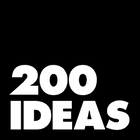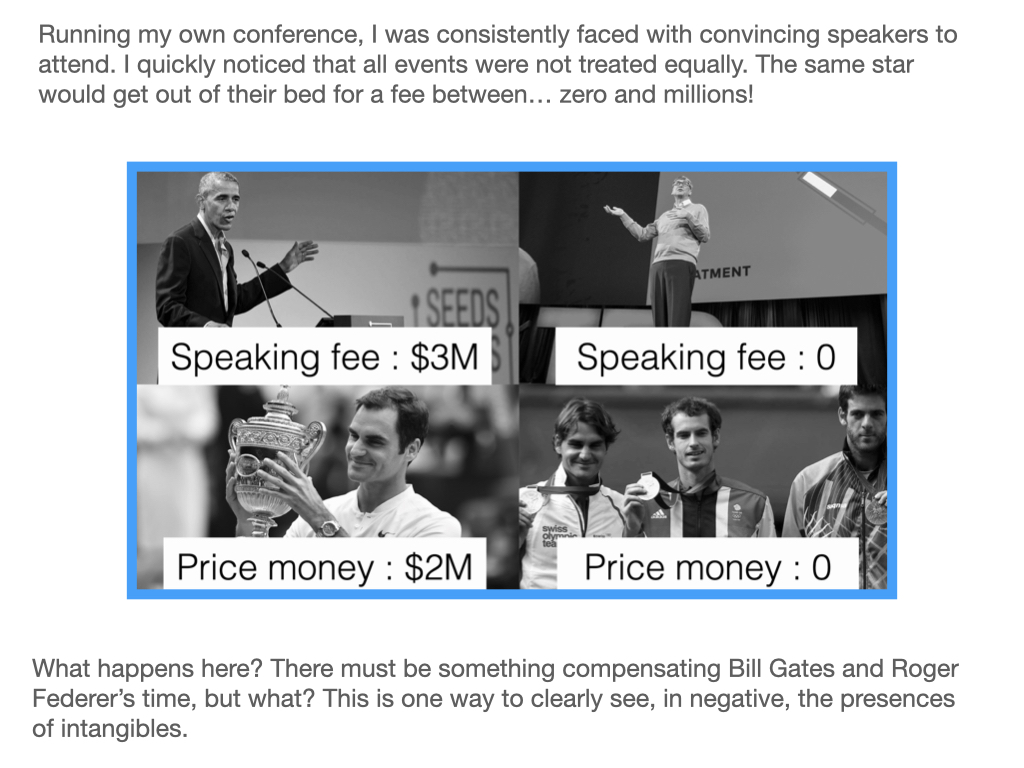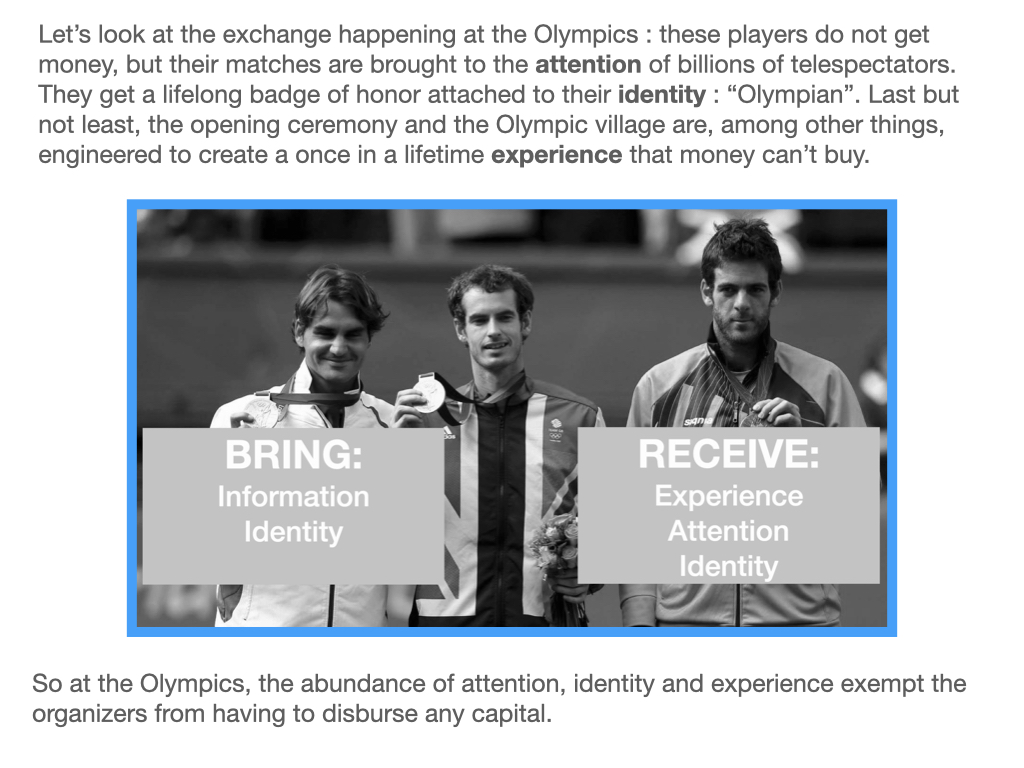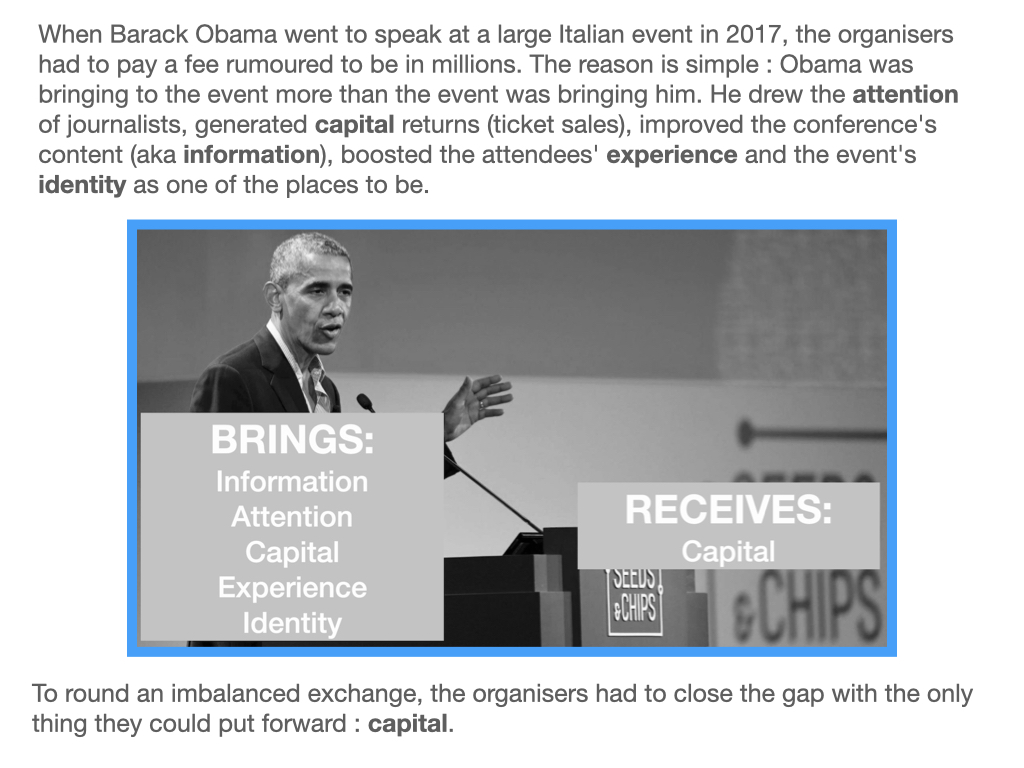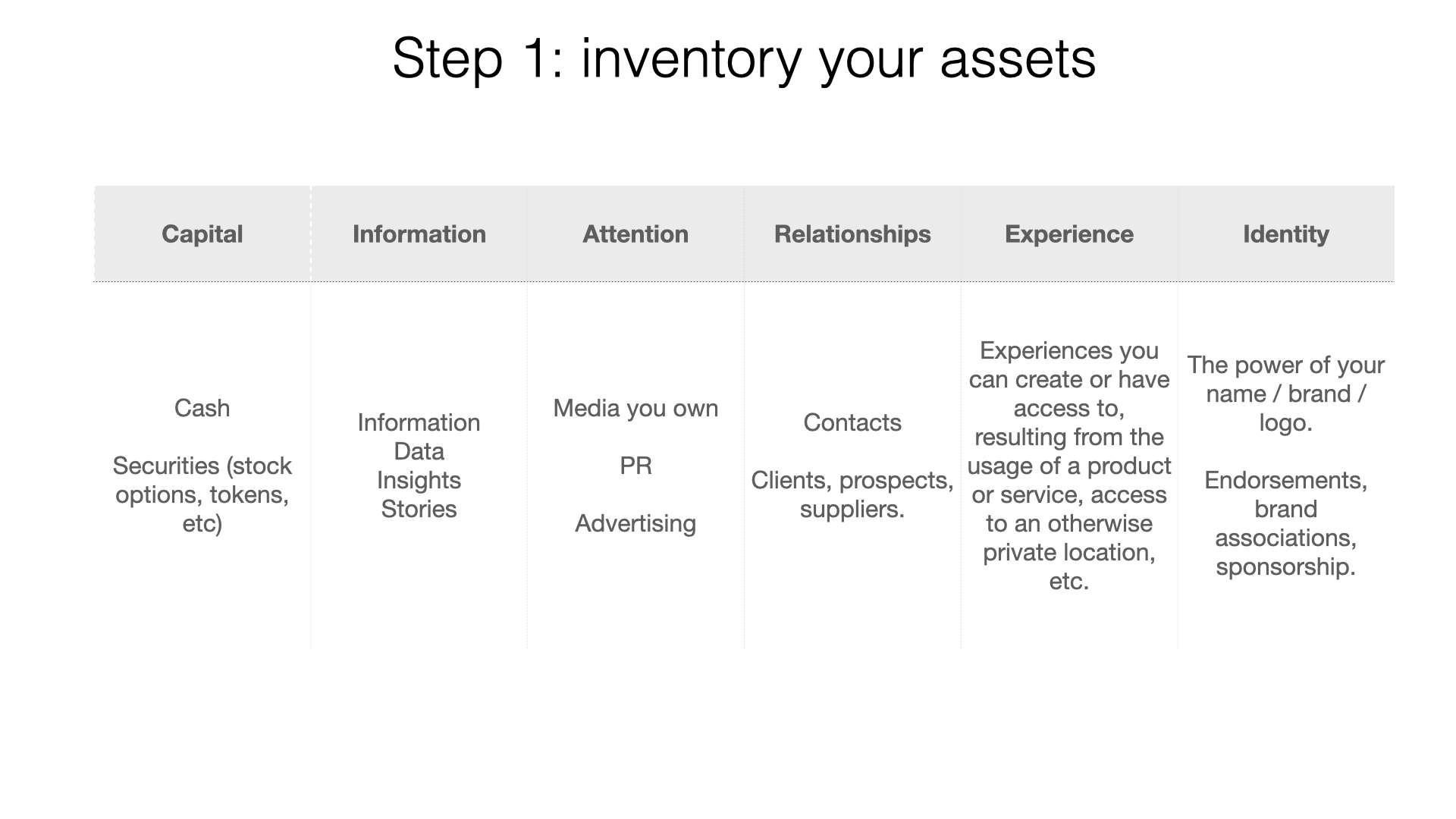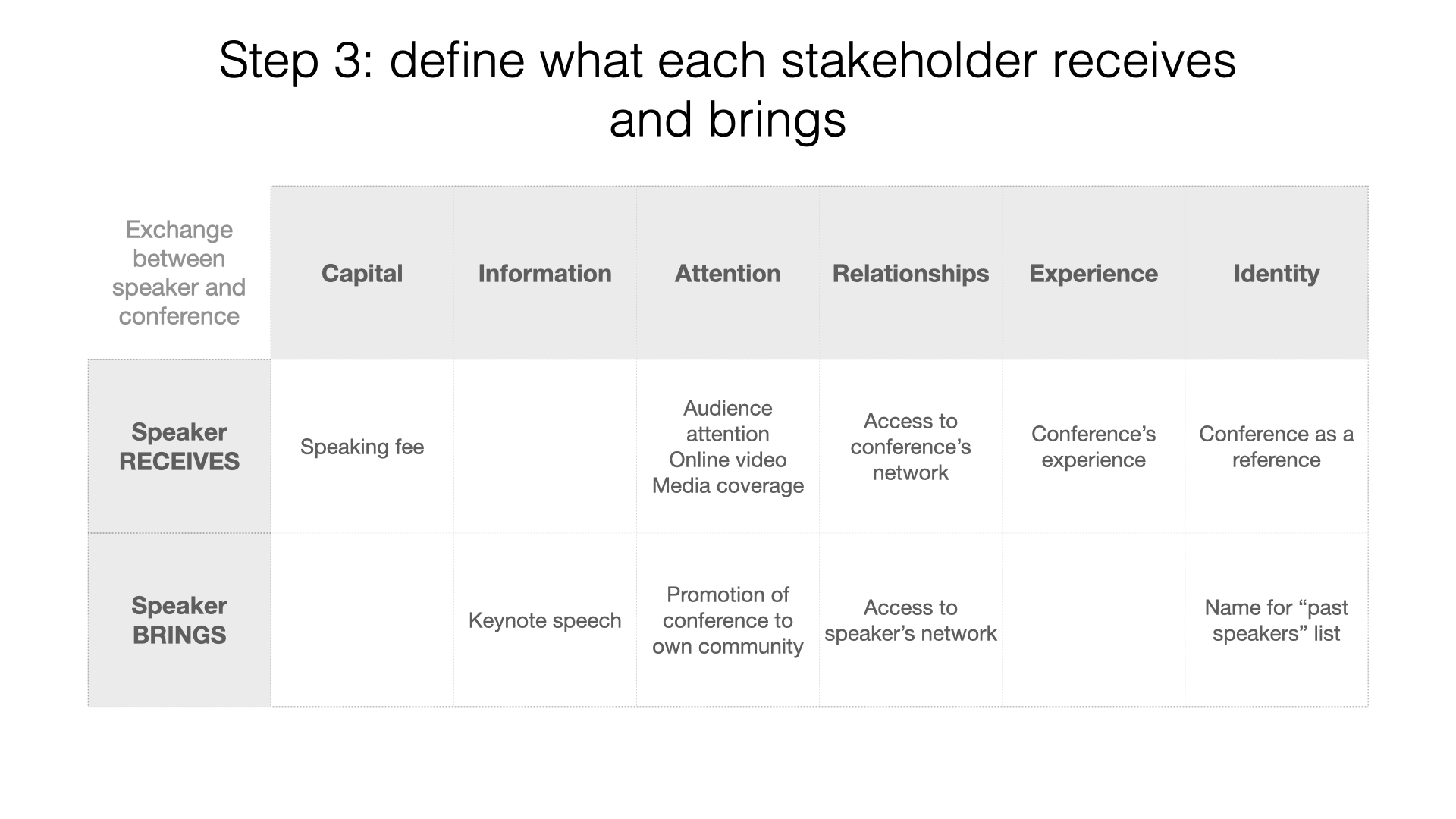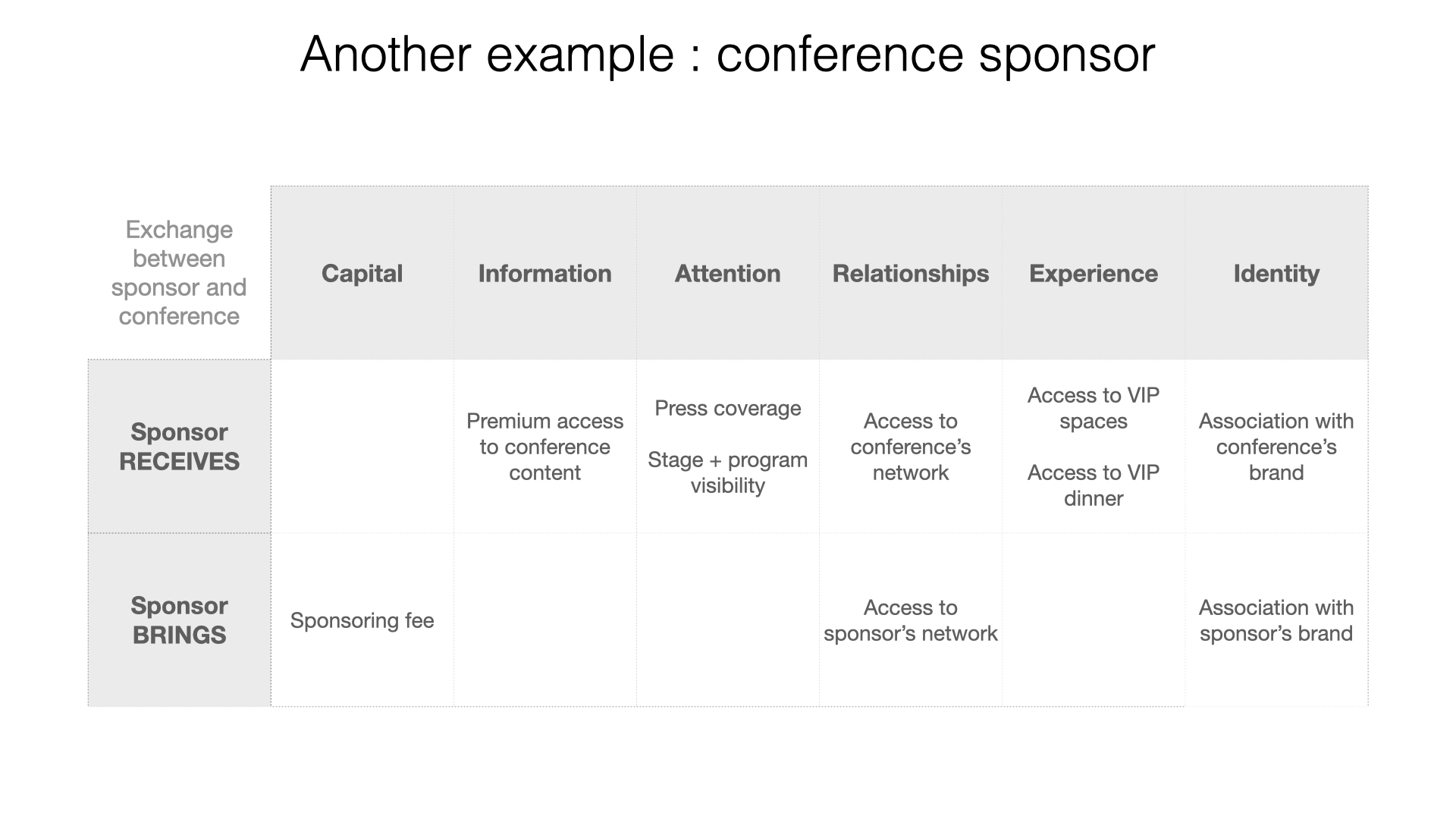The Business of Intangibles
Since 2015, I conducted dozens of interviews with people running conferences. My intent was to write a book on how to put together good events.
The project took an unexpected turn when I extended the scope to festivals, think tanks, schools, museums, hotels.
This led me to uncover one of the most useful idea I’ve ever come across : that all these organisations are platforms manipulating the world’s most precious assets : relationships, attention, information, experience, identity and capital.
This article explains the key ideas, and proposes tools to allow you to use this framework in your own context.
Key findings
The Olympics, SxSW, Lolapalooza, Montreux Comedy Festival, MOMA, Burning Man, all these institutions are in the same business : facilitating the circulation of intangibles assets within their community of influence.
Despite being invisible and hard to measure, these assets are what we gather, build, grow and trade on a daily basis.
These assets are relationships, attention, identity, information and experience. Together with capital, they are the blood of 21st century organisations, what allows them to function, grow, and differentiate.
Seeing the intangible
The assets
Despite the absence of effective ways to identify and measure those assets, they are all around us all the time as the previous examples show. The 6 assets are.
Relationships
A connection between two parties that has been facilitated by the platform. Not called “networking” to reflect the fact that this asset is most precious when qualitative, i.e. a real relationship.
Attention
Eyeballs, usually coming through a combination of owned, earned and paid media. Not called “visibility” because what matters is not only the ability to broadcast, but also the ability to be heard.
Identity
A positive boost to someone’s reputation and social status, coming from a transfer or endorsement from the platform. Burning Man mints Burners, Harvard mints Harvardians.
Information
Data, information, knowledge, insights, content. The “new oil” if you believe the hype. Also likely it is the most traded asset in the world.
Experience
“The way that something happens and how it makes you feel” according to the Cambridge Dictionary. In this model, products and services are considered experiences.
Capital
Cash, securities, tokens. An essential, central, yet boring and indistinctive asset. Often the easiest to trade because of its measurability and interoperability.
Flows
Let’s look at what happens inside an event we all know : the Olympics. Let’s focus on 4 key stakeholders : athletes, television, sports federations and sponsors.
⚠️ WORK IN PROGRESS ⚠️
A framework for your projects
Let’s put this framework in motion for your project.
Use cases :
- I’m an incubator, what should I offer concretely?
- I’m a government actor, how can I support innovation concretely?
- I’m an investor, how can I stand out from the competition by offering more than money?
- I run a think tank, what do I sell concretely?
- fundsraising for event
- building an incubator from scratch
- running a museum
- person : works really well with an individual
- speaker who needs to find value in an unpaid invitation
Contributors
Alice Rawsthorn (Design Critic)
Alison Boyd-Gellers (Renaissance Weekend)
André Laubscher (Geneva University Hospitals)
André Schneider (World Economic Forum)
Anne Krebs (Le Louvre)
Antoine Geissbuhler (Geneva University Hospitals)
Bertrand Levrat (Geneva University Hospitals)
Boris Veldhuijzen Van Zanten (The Next Web)
Brendan Harkin (Xmedialab)
Brett Leve (Summit)
Bruno Giussani (TED)
Carl Honoré (Author and speaker)
Christophe Dubi (International Olympic Committee)
Claus Sendlinger (Design Hotels)
Clément Marcelet (Airbnb)
Courtney Boyd Myers (Summit)
Daniel Rosselat (Paleo)
David Rowan (Wired UK)
Duncan Stutterheim (ID&T)
Eric Brun-Sanglard (Blind interior designer)
Étienne de Balasy (Actor)
Felix Koch (C Space)
François Hisquin (Octo / USI)
Frédéric Mazzella (CEO Blablacar)
Geraldine Le Meur (Le Web)
Jean-François Bouchard (C2)
Jean-Claude Biver (CEO TAG Heuer)
Jeff Rosenthal (Summit)
Jefferson Hack (Dazed)
Jeremiah Owyang (Crowd Companies)
Jon schmitz (Chautauqua Institution)
Juliana rotich (Ushahidi)
Julien Carette (Havas)
Kara Swisher (Recode)
Kitty Leering (PICNIC/Thought For Food)
Kris Kimel (Ideas Festival)
Kushtrim Xhakli (Dokutech)
Laura Penn (speakers coach)
Laurence Corona (Ateliers de Couthures)
Laurent Bolli (BB Studio)
Leetha Filderman (Poptech)
Lisa Gierszal (Chautauqua Institution)
Marian Goodell (Burning Man)
Martin Sirk (ICCA)
Martin Talvari (Slush)
Maryam Ghaemmaghami Scoble (ServiceNow)
Mathias Holzman (Palomar5)
Mathieu Jaton (Montreux Jazz Festival)
Matt Locke (expert storyteller)
Michael Lang (Woodstock)
Monique van Dusseldorp (Next/TEDx Amsterdam)
Nancy Duarte (Persuasive Presentation Experts)
Paola Antonelli (MoMA)
Pascal Viot (Paléo)
Patrick Aebischer (EPFL)
Pep Rosenfeld (Boom Chicago / Boom Chicago Creative)
Philippe Gudin (Le Rosey)
Pierre Lukaszewski (Fondation Jan Michalski)
Richard Saul Wurman (TED founder)
Robert Scoble (UploadVR)
Robin Chase (CEO Zipcar)
Romain Vez (UEFA)
Sebastian Buckup (World Economic Forum)
Sebastien Tondeur (MCI)
Stefana Broadbent (Nesta)
Steffi Czerny (DLD)
Suzy Menkes (Conde Nast Luxury Conference)
Sylvester Lindemulde (Nachtlab)
Thomas Madsen-Mygdal (Reboot)
Tim Harford (Author)
Tim O’Reilly (O’Reilly Media)
Vassili Christodoulou (The School of Life)
Vint Cerf (Google)
Yann Zopf (World Economic Forum)
Yves Daccord (ICRC)
